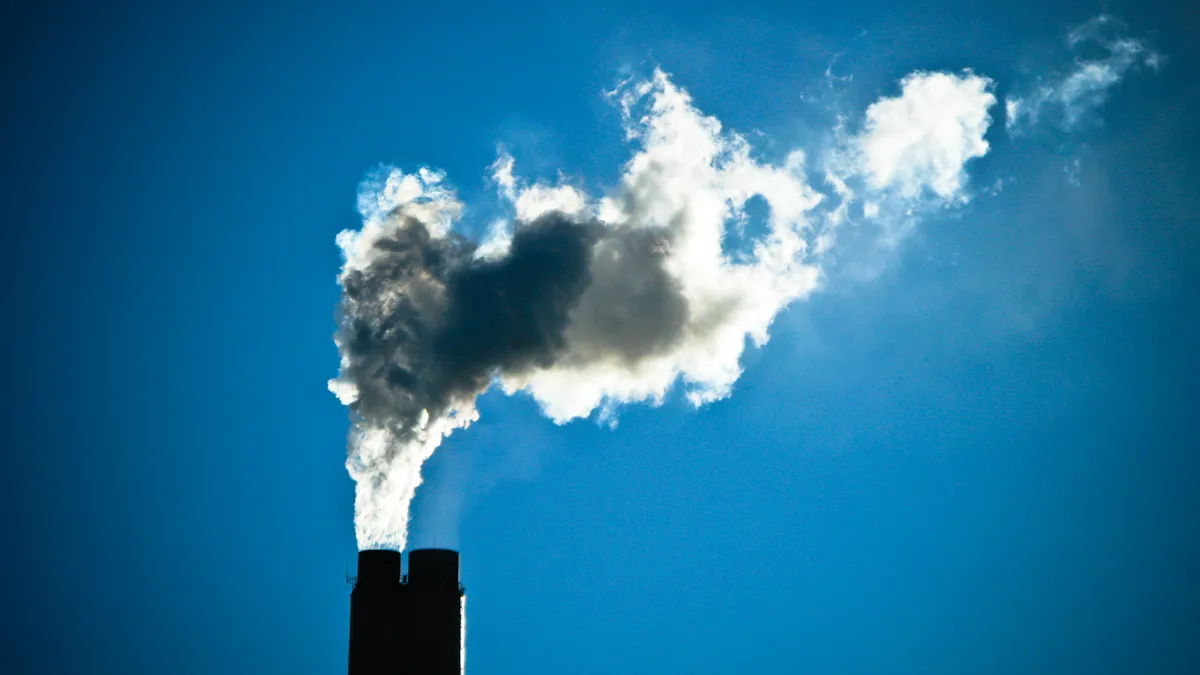UPDATE: May 3, 2019: Governor Ralph Northam, D, said May 2 he won't veto language in the Virginia budget that prevents the state from joining the Regional Greenhouse Gas Initiative. Northam's advisers thought he didn't possess the legal authority to veto the language, The Washington Post reported. But the governor is directing the Department of Environmental Quality to find ways to implement a recently finalized rule to reduce carbon emissions from large fossil fuel-fired power plants in the state 30% by 2030, he said in a statement.
Dive Brief:
- The Virginia Air Pollution Control Board (APCB) has approved new rules to reduce and cap carbon emissions from large power plants, an important step for the state to participate in the Regional Greenhouse Gas Initiative (RGGI).
- RGGI is a market-based program to reduce greenhouse gas emissions, composed of individual carbon dioxide budget trading programs in nine states. New Jersey has been moving towards rejoining and Pennsylvania has also been looking at joining the program.
- In order for Virginia to move forward with RGGI participation, Gov. Ralph Northam, D, will need to veto language in the state's budget that would forbid the state from participating. Earlier this month, lawmakers rejected amendments that would have removed the prohibition.
Dive Insight:
Northam vetoed legislation a year ago designed to prohibit either the Virginia governor or a state agency from establishing a carbon dioxide cap-and-trade program. Now, environmental advocates are calling for him to strike language from the state's budget that would prohibit spending money to join RGGI.
Virginia's governor has line item veto authority over the state's budget, as do governors in most states.
Walton Shepherd, Virginia policy director for the Natural Resources Defense Council, called for Northam to "demonstrate leadership by vetoing the General Assembly’s procedural roadblock of the plan."
"Virginia is advancing the boldest plan in the South to curb carbon pollution from power plants," Shepherd said in a statement. But "two snags must be cleared up," he added. Along with a veto of the anti-RGGI language, NRDC also wants Northam to drop biomass from the state's renewable portfolio standard.
Should APCB's new rules go into effect, the agency said it would reduce carbon emissions from large fossil fuel-fired electric power generating facilities 30% by 2030, with an initial cap of 28 million tons of CO2.
APCB said the regulation ensures that Virginia is "trading-ready” to participate in a carbon market, and that the Northam administration "will continue to explore options that comply with state law to ensure that regulated entities are able to reduce pollution at the lowest cost through a number of market-based approaches."
Virginia Secretary of Natural Resources Matthew Strickler said adopting the new rules sets the state "on a path to slow global warming, and signals to clean energy businesses that Virginia is poised for a significant expansion of solar and wind power.”
RGGI officials say the 2019 cap is 80.2 short million tons, though participating states also include interim adjustments to the cap to account for banked CO2 allowances. The 2019 RGGI adjusted cap is 58.3 million short tons.
Virginia would be the first new state to join RGGI since the market launched in 2009. New Jersey was an original member of RGGI, but the state withdrew in 2012 under the leadership of former Gov. Chris Christie, R. In 2018, Gov. Phil Murphy, D, issued an executive order to rejoin the trading system. The state has indicated it is on track to participate in RGGI's 2020 carbon auction.















